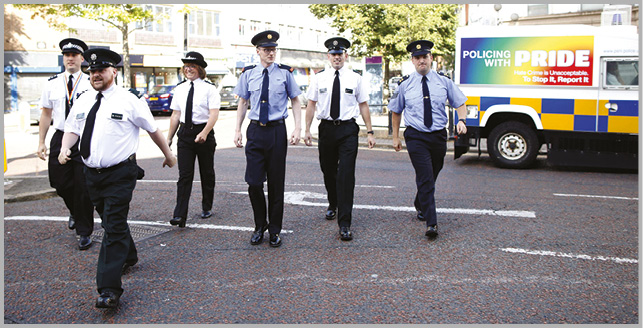Parading with Pride


Uniformed police officers taking part in this year’s Pride festival have been praised for their proactive approach but have also come in for criticism for allegedly siding with those in favour of equal marriage.
The PSNI responded to criticism for their decision to allow uniformed officers to take part in the annual parade through Belfast by describing the event as an opportunity to “reach out and build confidence in this community”.
Stating that the PSNI’s involvement had no political basis, Chief Constable George Hamilton highlighted a high level of unreported hate crimes against the LGBT community and a lack of confidence in his service in dealing with such crimes.
The main criticism stemmed from those who view Pride as a protest parade against the ban on gay marriage in Northern Ireland, rather than a celebration of inclusion and representation for the LGBT community, which organisers describe it as.
While participation in Pride parades by public services has become commonplace across the UK, Northern Ireland is unique because it is the only region that retains a ban on same-sex marriage.
Prior to the parade, TUV leader Jim Allister wrote an open letter to the Chief Constable calling for the PSNI to cancel their involvement in what he described as a “political campaign”.
“This is a highly-politicised event with the demand for a change in the law to permit same sex marriage at its heart. Why is the PSNI joining in this political campaign?”
The Orange Order, who also viewed the parade as a political one, questioned whether the PSNI had now changed their position on uniformed involvement in parades.
However, the PSNI have confirmed that they will not be sanctioning the involvement of uniformed officers in Orange Order marches.
Pride organiser Denise Hart said the move by the PSNI was “hugely significant” and showed that Belfast is becoming “an increasingly inclusive and diverse city”.
Hamilton defended the move, saying: “It’s certainly not anywhere near the political space of the debate about demanding change for equal marriage. This was us reaching out and showing a connection with a community that has historically lacked confidence in the ability of the police to take them, as victims, seriously, and therefore deal with the under-reporting issue and the under-representation of people from that community in the police service.”





